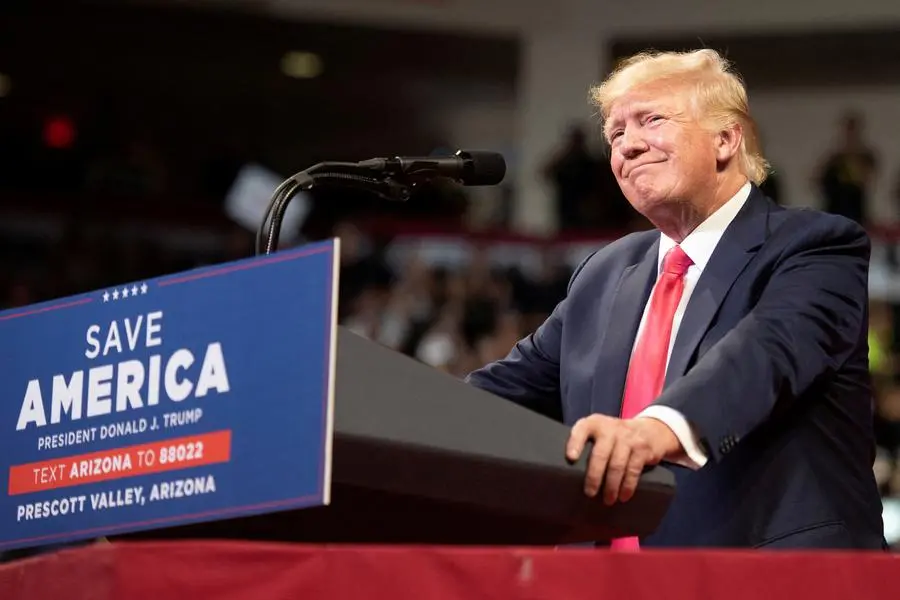PHOTO
WASHINGTON: Former President Donald Trump on Monday asked a federal court to temporarily block the FBI from reviewing the materials it seized two weeks ago from his Florida home, until a special master can be appointed to oversee the review.
Trump's motion, filed in federal court in West Palm Beach, Florida, also demanded that the U.S. Justice Department provide him a more detailed property receipt outlining items the FBI seized from his Mar-a-Lago home during its Aug. 8 search, and asked investigators to return any items outside the scope of the search warrant.
"Politics cannot be allowed to impact the administration of justice," the filing says. "Law enforcement is a shield that protects Americans. It cannot be used as a weapon for political purposes," it added.
A special master can sometimes be appointed in highly sensitive cases to go through seized materials and ensure that investigators do not review privileged information.
When FBI agents had searched the homes of Trump's former lawyers Michael Cohen and Rudy Giuliani the U.S. Attorney's office in Manhattan requested the appointment of a special master.
Trump's request was assigned to U.S. District Judge Aileen M. Cannon, whom Trump appointed to the bench. A Justice Department spokesman said prosecutors would file their response in court.
“The Aug. 8 search warrant at Mar-a-Lago was authorized by a federal court upon the required finding of probable cause," Justice Department spokesman Anthony Coley said.
Magistrate Judge Bruce Reinhart, of U.S. District Court in West Palm Beach and who approved the warrant, is weighing whether to require the Justice Department to release a redacted copy of the affidavit laying out evidence for probable cause to search Trump's home.
The Justice Department at a court hearing last week opposed the affidavit's release, saying it would provide a "roadmap" of its investigation and possibly chill witness cooperation.
In a court order filed on Monday, Reinhart said he agreed those were legitimate concerns, but said he wants to explore whether there is a "less onerous alternative to sealing the entire document."
The Justice Department has until noon on Thursday to provide Reinhart under seal a redacted copy of the document that he could potentially release to the public.
The Aug. 8 search of Mar-a-Lago marked a significant escalation in one of the many federal and state investigations Trump faces from his time in office and in private business.
After Trump and his allies complained in the media that the search was politically motivated, U.S. Attorney General Merrick Garland asked the court to release a redacted copy of the search warrant and property receipt outlining the items taken.
The U.S. government has recovered more than 300 classified documents from Mar-a-Lago, including material from the CIA, the National Security Agency and the FBI, the New York Times reported on Monday, citing multiple people briefed on the matter. The items include material recovered by the National Archives in January and documents that Trump's aides gave to the Justice Department in June, the newspaper reported.
The Justice Department did not immediately provide comment, nor did aides to the former president.
The search is part of a federal investigation into whether Trump illegally removed documents when he left office in January 2021 after losing the presidential election to Democrat Joe Biden.
During its search the FBI seized 11 sets of classified materials at Mar-a-Lago, some of which were labeled "top secret" - the highest level of classification reserved for the most closely held U.S. national security information and which can only be viewed in special government facilities.
It is unclear whether Trump waited too long to seek the appointment of a special master.
Last week, Trump released a redacted Aug. 15 email he received from Jay Bratt, the Justice Department's head of counterintelligence, who indicated he had deployed a "filter" team of agents tasked with weeding out privileged materials. (Reporting by Sarah N. Lynch; additional reporting by Jacqueline Thomsen; Editing by Leslie Adler and David Gregorio)





















